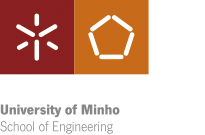Tuesday, 12/20/2016
Habilitation Exams: Luís Manuel Dias Coelho Soares Barbosa (DI)
15th and 16th
December 2016, Largo do Paço, Braga
Luís Manuel Dias
Coelho Soares Barbosa, professor at the Department of Informatics (DI) of the
EEUM and a member of the High-Assurance Software Laboratory (HASLab INESC TEC),
obtained in December the academic degree of habilitation, approved by unanimity
of the jury members.
The habilitation exams
took place over two days, beginning with the presentation of the candidate’s
curriculum to the jury members – António Beça Gonçalves Porto (Universidade do
Porto), Luís Manuel Marques da Costa Caires (Universidade Nova de Lisboa), José
Manuel Esgalhado Valença (Universidade do Minho), José Nuno Fonseca de Oliveira
(Universidade do Minho), Rolf Hennicker (Ludwig-Maximilians-Universität München,
Germany) – followed by an analysis and discussion of a report that addresses
the contextualization, structure and programmatic objectives of a curricular
core in modeling and analysis of reactive systems within the scope of the
Informatics offer in the University of Minho.
On the second part of
the exam, Luís Manuel Dias Coelho Soares Barbosa presented the seminar entitled
“Coalgebra for the working software engineer”, which constitutes a summary of
the research developed in theory of coalgebras and its application to basic
problems of Software Engineering. This recent theory, aptly known as the
"mathematics of dynamic systems", provides a rigorous and
compositional approach to the analysis of the behavior of this type of systems which are pervasive in modern societies. The lesson focused on some aspects of the theory
and its application to three areas of Software Engineering: modeling of
dynamic systems, their architecture and, finally, the development of logics to express and verify system's requirements and emergent behavior .
The habilitation
degree is granted to professors to whom a high merit professional curriculum
demonstrating relevant research activity, advanced training or supervision is
recognised, along with the authorship of high quality scientific papers after
obtaining a doctoral degree.

